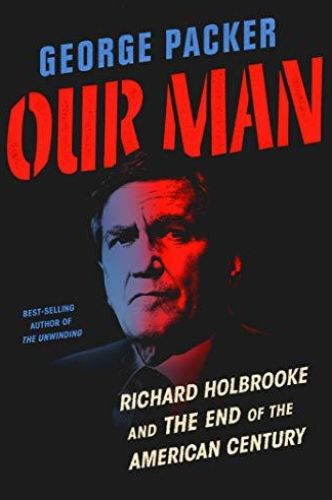Journalist George Packer provides an in-depth, unsparing portrait of a charismatic diplomat whose career mirrored America’s place in the world.

Packer on Holbrooke
In a half-century of American geopolitical adventures, diplomat Richard Holbrooke strode the global stage. As journalist George Packer reveals, from Holbrooke’s rookie season in Vietnam to his swan song in Afghanistan, he strived for a spot in the history books. On occasion, as when he helped broker peace in the former Yugoslavia, he lived up to visions of his own grandeur, but most of the time, Holbrooke proved his own worst enemy. Packer uses this unflinching study to tell the story of the United States’ shifting role in the world.
Packer’s efforts made his book a finalist for the Pulitzer Prize in biography and the winner of both the Los Angeles Times Prize for biography and the 2019 Hitchens Prize. The New York Times Book Review recognized Packer’s bold scope when it wrote, “If you could read one book to comprehend America’s foreign policy and its quixotic forays into quicksands over the past 50 years, this would be it.” And Buzzfeed called this “the best guide you can find to navigating a transitional moment in American leadership and foreign policy.”
Vietnam
Born in New York City in 1941, Holbrooke attended Brown University, where he became editor of the student newspaper. Packer narrates Holbrooke’s first diplomatic posting in Vietnam in 1963, a time when many believed the Vietnam War would end quickly. Packer characterizes US generals as unable to fathom that Viet Cong peasants would stand and fight. In those early days, the author reveals, even US journalists embraced the mission of containing communism.
Holbrooke lived through action, and it is through action we can know him.George Packer
According to Packer, Holbrooke liked to get out into the field – he flew over Viet Cong territory numerous times in aircraft exposed to enemy fire. Holbrooke eventually came to the conclusion that the Viet Cong were winning. Packer highlights one example of Holbrooke’s perspicacity: He recognized that rebels were firing at US planes to goad Americans into bombing villages and then using the destruction to recruit villagers to the Viet Cong.
Throughout 1964 and 1965, Holbrooke, then in his early 20s, told anyone who would listen that the US war effort was misguided. In 1966, he moved to Washington, DC, where, Packer reports, Holbrooke surmised correctly that he knew more about what was happening in Vietnam than anyone in Lyndon Johnson’s administration. But, Packer reveals, Johnson had no interest in Holbrooke’s insights.
Marriages
Packer notes that, after marrying for a second time and indulging his new bride’s expensive tastes, Holbrooke launched a consulting firm. His clients included Seagram’s, Hyundai and Nike, and Holbrooke earned a million-dollar payout after selling the firm. But, Packer found, Holbrooke never loved business as much as he loved diplomacy.
Packer recounts that Holbrooke, after his second marriage ended, dated CBS correspondent Diane Sawyer for much of the 1980s. Packer explains how Holbrooke’s leaks to Sawyer during the Iranian hostage crisis helped raise her professional profile. Packer reports that Sawyer eventually tired of his high-maintenance, disorganized style, so when he proposed marriage, she declined.
Bosnia
Packer paints Holbrooke as self-dramatizing, blindly ambitious, competitive and shameless. Secretary of State Warren Christopher, Packer writes, realized those traits might make Holbrooke a match for Balkan warlords; in 1994, the State Department offered him the position of assistant secretary for Europe.
Holbrooke, who loved history, told the kind of story history loves.George Packer
Packer portrays with relish how Holbrooke – to send the message that he was a different kind of diplomat than his predecessors – would scream at Serbian president Slobodan Milosevic. And Packer highlights Holbrook’s lies: For instance, he brokered a ceasefire by telling Muslim and Croatian leaders that President Bill Clinton would bomb both sides.
Packer bemusedly notes that Holbrooke received plenty of awards and honorary degrees in the United States, and burnished his legacy with a memoir, To End a War.
Barack Obama
Packer reports that, after Barack Obama won the presidency, Holbrooke angled to become secretary of state, but he annoyed the new president. Their uneasy relationship continued after Holbrooke accepted a job in Afghanistan and Pakistan. Packer reveals that, in a rare meeting with Obama, Holbrooke offered to deceive the leaders of Pakistan and Afghanistan to achieve peace. No lying, Packer reports Obama saying to the man who lied repeatedly to stop the Balkan war.
The author describes a dangerous incident in which Holbrooke spoke on an unsecured cellphone, allowing Afghan officials to listen in on the call. Packer cites this episode as undermining Holbrooke’s credibility and career. In failing health, Holbrooke died at 69 of a torn aorta.
Convincing Metaphor
Packer and Holbrooke make a fine match. Packer is one of America’s foremost journalists, with an unusually fine grasp of realpolitik and historical processes. He writes in a lively but slightly detached, almost cynical voice. Packer admires Holbrooke but finds him contemptible at times, and the author often expresses frustration with Holbrooke’s inability to get out of his own way.
Holbrooke? Yes, I knew him. I couldn’t get his voice out of my head.George Packer
That trait, Packer finds, enabled Holbrooke to function as a wholly convincing metaphor for the United States’ dunderheaded foreign policy during Holbrooke’s career. A superb overview of a man, a historical era and a nation, Our Man will benefit politicians, historians, students and anyone fascinated by global politics.
To augment your reading of Packer, turn to more Packer. His other books include The Unwinding, Last Best Hope and The Assassin’s Gate.






